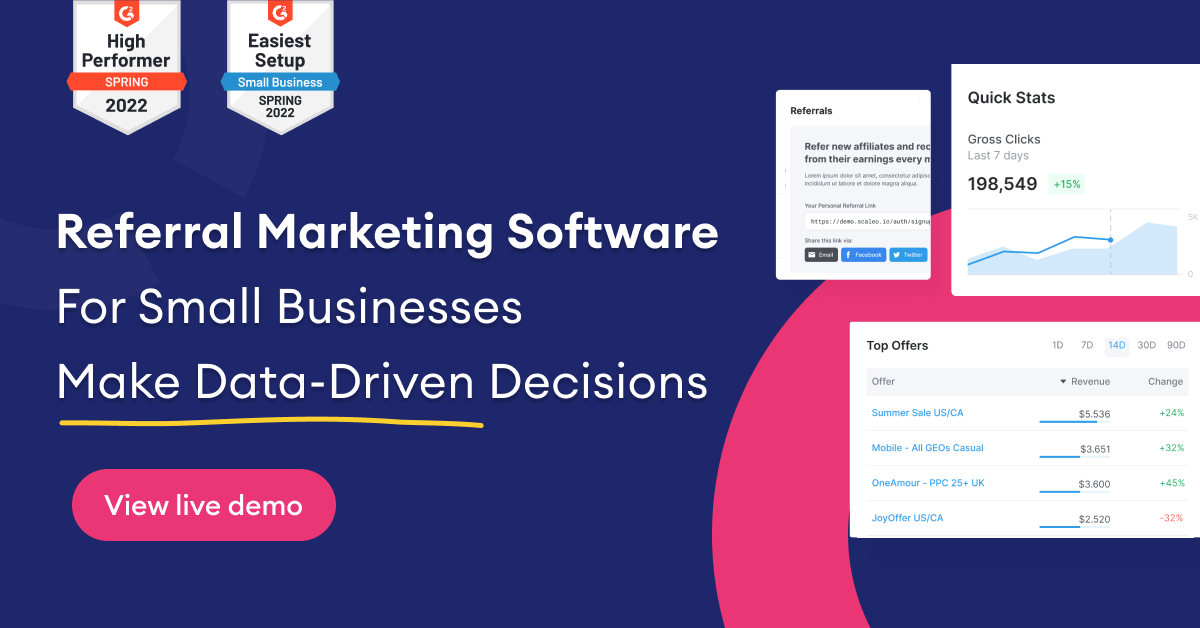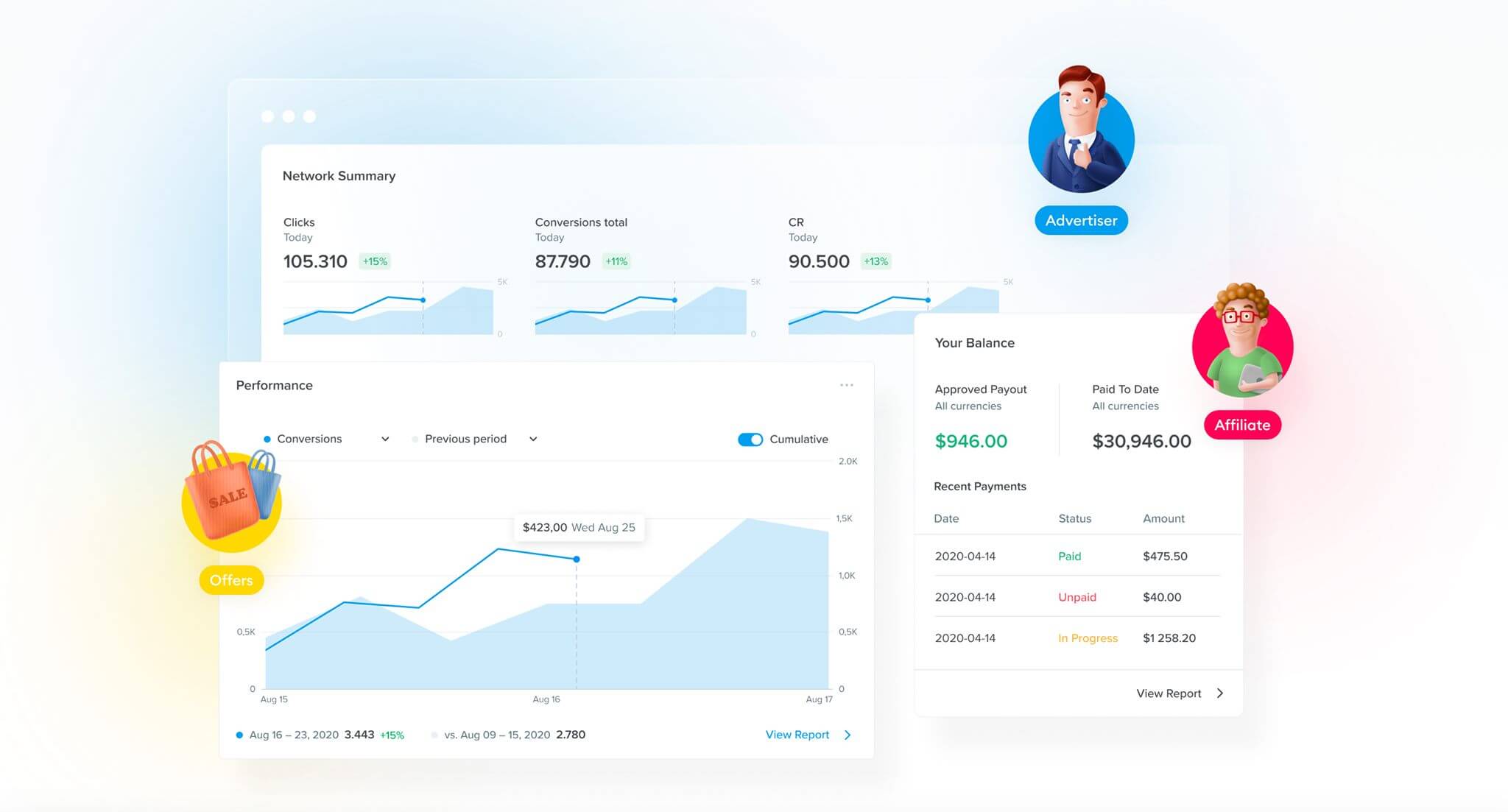Referral marketing for small businesses is different from the traditional referral marketing campaign conducted by large companies. Referral marketing has worked for businesses of all sizes and in all niches, but small businesses have some pros and cons that we will talk about today.
In this article, you’ll learn how to avoid pitfalls and take advantage of small business referral marketing to get the most out of your referral program or e-commerce website.
What exactly is referral marketing?
When a company gains a new customer through word-of-mouth, this is called “referral marketing.” An old customer or someone who knows the company might recommend it to someone who needs its products or services and, therefore, we say that he “referred” him.
Ever since the start of eCommerce shops online, many companies have set up referral marketing programs. These programs often compensate the referrer or the referral provider for the referral (or both). Referral marketing programs make it easier to track how well they work and let companies make the most of word-of-mouth marketing to get the best return on investment (ROI).
Why does referral marketing for small businesses works so well?

People tend to trust word-of-mouth referrals from friends and family more than any other source of information, so referral programs work in virtually every niche online. Customers do look for reviews online, but they are much more likely to trust a recommendation from a friend than a review from a stranger. It makes it easier for your customers to spread the word about their business by letting them share it with their friends by clicking a button.
However, if you implement a referral program, how can you increase the likelihood that your current customers will recommend your company to their friends?
Customer service is the name of the game.
If you go above and beyond to keep your customers happy, they will be happy to tell people about you because they want you to succeed.
Yes, because word-of-mouth referrals like this often happen without urging, they can be difficult to control. So why not formalize the process with a referral program that makes it easier for your customers to share (and rewards them for doing so)?

What are the benefits of a referral program for your small business?
Referral programs can benefit your small business in a variety of ways; here are the top four we decided to discuss today.
Cost-effective
Your small business needs to use its resources well. Referral programs are less complicated and less costly than other forms of advertising. Customers who tell their friends and family about us provide free advertising that money can not buy.
With a referral program, you do not have to spend as much money (or as much valuable time) on customer acquisition, and you do not have to target complete strangers with traditional marketing. Rather, you focus on existing customers who have a positive relationship with your brand. These loyal customers will advertise your business for you at little or no cost. Therefore, you do not have to spend nearly as much money on traditional advertising.

Furthermore, most referral program letters include pre-written language from your organization as well as space for the referrer to write their own personalized greeting. In any case, every referral message comes from a customer, not your brand. Referral programs are a good idea for more than one reason. People trust their friends more than traditional ads, so they’re a good investment for more than one reason.
Word of mouth spreads quickly, especially on social media. This cycle is accelerated because a referral program facilitates sharing. When a client posts their referral program on social media, all of their friends immediately become aware of your brand (and trust what their friend has shared). If a handful of those friends become new customers, there’s a good chance they’ll share the referral program with their own friends on social media. So the cycle continues indefinitely.
Builds loyalty
Referred customers are 18% more likely to remain your customers and have a greater lifetime value. After all, they have faith in their pals! On the other hand, incentives for referring friends, such as discounts, store credits, and free products, on the other hand, give your referring customers a reason to keep coming back.
10 best practices for small businesses that use referral marketing
Now that you understand how a referral program might help your small business thrive, let’s go over some best practices for creating your own referral program. Implementing these practices will help you ensure that you are not only optimizing your ROI but also using your budget wisely across all marketing channels. Since referral marketing requires minimal effort on your part, as opposed to traditional ad campaigns, most of the work is done upfront while setting up the referral program and promoting it. Afterward, most of it runs automatically, and you can just sit back and enjoy watching your business scale up.
1 – Getting customers to participate in the program
It all starts with focusing on the right customers first. If you find a small group of early adopters, they can help build a larger group of supporters. Since “referral” implies it would be an existing happy customer, your goal is to identify this group of happy customers who enjoy your product or service and will be more than happy to recommend it to their friends and colleagues, especially knowing that they will be generously rewarded.
For an existing client who pays subscription fees, for example, a good rewarding system would be discounts or upgrades for their ongoing subscription. This is a win-win situation for both you, as a small business owner, and for your customer.
For the “price” of a small upgrade or reduced service fees, which, in most cases, won’t hurt you, you will get a whole new (freshly referred) paying client.

Other than that, here are some ways to get more people interested in your program:
- Make your referrer’s progress public. Friendly competition can spur them on to spread the news even further.
- Take it a step further and conduct a competition to see who is your “top” referral. If you don’t want your customers to compete with each other, hold a random drawing for each person who has X referrals in a certain amount of time. This will at least encourage them to step in and try and make active referrals in any given time period.
2 – Determine the types of incentives to provide
In an ideal world, each of your delighted customers would promote your business even if there was nothing in it for them. However, most individuals on Earth require a little extra nudging in the form of incentives.
Consider the ideal incentive that could persuade them to tell their friends and relatives about your business. Some businesses give a flat rate in exchange for a referral, while others create contests that encourage customers to compete to bring in additional customers for their business.

Furthermore, double-sided awards are one of the most effective types of customer referral program incentives.
By introducing this type of referral program, companies like Uber, PayPal, and Dropbox grew into giant corporations.
In essence, a double-sided referral program rewards both the person who successfully refers a new customer and the person who refers. This usually happens in the form of discounts or rebates.
This is mainly designed to encourage potential customers to sign up. You often see it in influential marketing, when the YouTuber, for instance, says that if you sign up using my special code, you will get a $100 instant bonus on your account.
With the correct incentive, you will not only win a new customer, but your existing customer will be more inclined to make additional purchases and remain loyal to your brand. Just make sure to choose a cost-effective incentive that your customers will appreciate.
3 – Safeguard from program abuse
If you are just getting started with a referral marketing program, remember that for every 99% of customers who will play fairly and 99% of affiliates who will refer fairly, there will be one percent who will try to rig the system.

As a small business, it’s your job to prevent this from happening because a few referral waves of abuse can affect your marketing and budget plans. What can you do to prevent this from happening?
Practical solutions to prevent referral fraud are:
- Provide non-monetary prizes (discounts, gift cards, or loyalty card points) for each customer referred.
- Customer purchases and engagements, not just invitations or leads, should be rewarded.
- Monitor the referral program’s performance on a regular basis.
- Limit how many times a customer can use his or her referral code.
Technical remedies against referral fraud are:
- Keep track of IP addresses.
- Keep a record of comparable email addresses and email patterns.
- Examine the referral rates.
- Restrict referral redemptions from rooted devices and emulators.
Don’t feel like doing it all manually? Want to make sure your referral program is safe and sound while the business is running smoothly? Scaleo has an automated safeguard system; read more about Anti-Fraud Logic.
Make it simple for customers to share on social media.
Why concentrate on social? Because it is where your customers organically share with a large number of their friends at the same time. By adding social sharing to your referral program, you will be able to do more with less time and effort.
Make it as easy as possible for customers to post about your referral program on social media. Add buttons with pre-filled message templates that can be customized by each customer and shared with the press of a button to do this.
5 – Make your referral program personal
Learn to recognize your customers’ names and shopping habits, strike up a conversation with them to learn more about their position and desires, and greet them as you would an old, close friend—all of this will make them feel welcome and special. And it is precisely these emotions that motivate them.
This can be easily outsourced to software, for example, you can use the “name” parameter from their registration to send out personalized emails, or pull out products they have purchased and ask if they would be willing to review and recommend it to their friends, if they do so, they will get a reward.
6 – Add analytics and automate the process
Once everything is in place, attempt to put as much as possible on autopilot, because marketing automation is the future of online business. Because once your referral program begins to provide results, you’ll want to scale it and allow it to thrive without it taking up too much of your attention. This is where automation may help.

Consider using referral program software like Scaleo to generate invoices automatically, add offers and set up their expiration date, and more… all on autopilot!
You should also keep track of who referred who, how much those referred customers spent, how many recommendations happened each day, and the program’s overall effectiveness. You must also ensure that customers are not abusing your referral program. As a result, make sure to set up analytics to accurately measure all of these important performance metrics.
Why should anyone believe you? That is the first (and often most difficult) question that affiliate marketers must ask themselves.
I believe webinar marketing can be a significant part of the solution.

Webinars are online workshops or classes with two goals: learning outcomes for attendees and marketing or sales outcomes for your business. Webinar marketing involves holding online workshops to get people interested in your small business and to promote it. A webinar platform is, in a sense, a digital classroom that is meant to turn great lessons into business success.
When you try to promote your new referral program, it could be a great idea to establish trust with your newly signed-up affiliate marketers and teach them the best practices for referring customers your way. There is no better way to demonstrate your authority than to use your own knowledge to provide consumers with genuine, measurable value. What could be more important than a wonderful lesson?
Referral Marketing For Small Business – Conclusion

Referral marketing for small businesses is different from the traditional referral marketing campaign run by large companies. A referral program is a great way to encourage your customers to spread the word about your business at a much lower cost than other traditional forms of advertising.
Your customers will feel like they are an important part of your company’s success, and your relationship with them will be strengthened. In addition, you will attract new customers and can create a network of people who will subsequently recommend your products or services even free. After all, people trust their friends and family more than they trust your company’s messages or an ad campaign.
Make sure you create incentives that are related to your business, such as credits, discounts, or gift cards. Use marketing techniques that encourage a community of friends and help your business. With the tips we have highlighted in this post, you can ensure your referral program takes off faster and has a better chance of success. Good luck!
Last Updated on November 28, 2023







